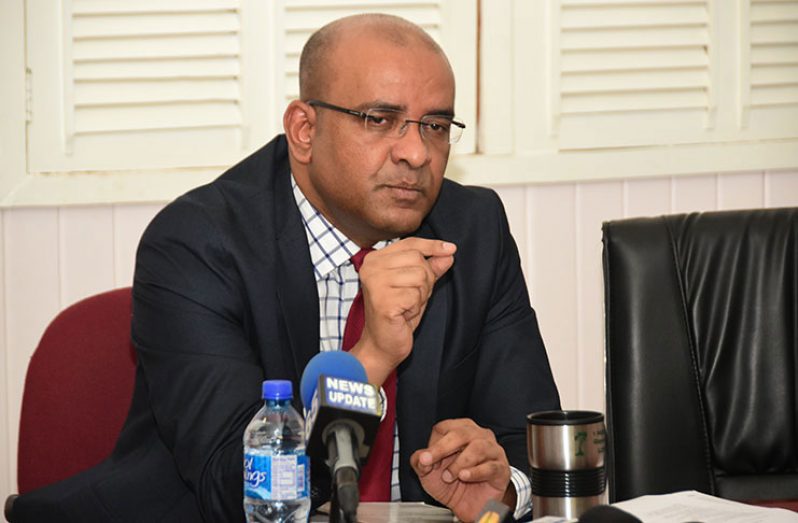OPPOSITION Leader Bharrat Jagdeo says he is in favour of conditional cash transfers as a means of improving the livelihood of Guyanese as opposed to simply distributing money when oil revenues begin to flow.
“I support conditional transfers, we’ve done that before and we need to help poor people,” Jagdeo said at a press conference at the Office of the Leader of the Opposition on Thursday.
Asked to elaborate on the opposition’s utilisation of conditional cash transfers while in Government, Jagdeo referred to a $50M partnership with the Guyana Bank for Trade and Industry Limited (GBTI) on the Women of Worth (WOW) programme. This, he said, was an initiative through which single-parent women could receive interest-free loans.
“That was a form of transfer. It was not done directly to individuals, but it made credit available to single women at zero interest rate. The availability of credit to poor people is critical for them to start businesses and to get out of poverty,” he said, adding: “In the Apprenticeship Programme and some of the other facilities we started, we said if you want the money, the tiny monthly grant we use to give, you have to show attendance at an educational institution. So that is why it’s conditional upon achievements of other targets.”
However, Jagdeo was critical about those who spoke about the possibility in a light that caused persons to believe that come 2020 large sums of money would just be handed to them. “You can and governments should do these sorts of things but not to create a syndrome where people believe, or to create the impression, that because oil is coming we will get a sum of money every year and we have to stop working,” he said.
Speaking to how cash transfers can be conditional he went on to suggest that pensioners could also be given a tiny amount every month to enable them to get tested for diabetes and hypertension to reduce the cost burden on the health sector.
Along with his recommendations, the opposition leader put forward other issues he had with the idea of cash transfers and recommended that portions of the oil revenue be injected into education and job creation.
“What about the years when oil prices sink so low…for long periods like it has happened in some countries and people [because] they think they’ll get this money all the time? We have to help them create jobs, we have to help them with education. So why not put the money into paying for scholarships? We take $100M or $50M and we put it to help our kids who do well go to the best universities around the world and upgrade our university to a topnotch university with a global standard by bringing in new lecturers. That sort of thing would help us in the long run,” he suggested.
The topic came up for discussion following the recommendation of Professor Clive Thomas that the government make annual cash transfers to every household when it begins to receive its net inflow of revenue from oil production. Since then, both Minister of Finance Winston Jordan and Minister of Natural Resources Raphael Trotman have commented on the matter.
“Rather than just giving people US$5,000 a year, why not look at issues such as education, health, youth programmes, small businesses,” he said, stating further: “I would rather hear more debate about using our resources to create opportunities for people so that they themselves could have lasting incomes as opposed to short-term incomes because monies that you are going to be giving out will soon end and you would have pitched your lifestyle sooner or later to the monies that you receive and when you can no longer give those monies, then what is going to happen?” Jordan said on Wednesday.
Meanwhile, Trotman had stated: “It is possible and I don’t think we should reject it outright. It is possible if it is structured. You want to ensure that people who receive transfers serve their country and so we may look at it by added value in the pensions. We want to ensure that our young people have educational grants, we want to ensure the people who receive cash transfers are registered in our tax system and have paid taxes and not turning up and say ‘I am here to collect’.” Trotman has since noted that he will make a representation in this regard to Cabinet.












